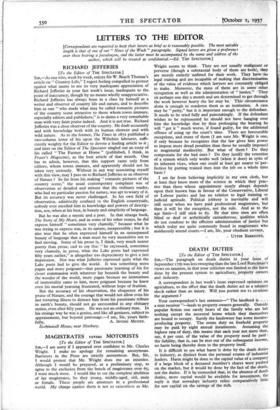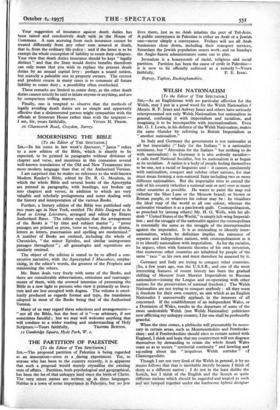DEATH DUTIES
[To the Editor of THE SPECTATOR.] SIR,—The paragraph on death duties in your issue, of September 17th was less sweeping than the late Lord Runciman's views on taxation, in that your criticism was limited to the harm done by the present system to agriculture, property owners
and industry.
A correspondent in last week's issue expressed opinions on agriculture, to the effect that the death duties act as a salutary shock rather than an injury. Will you permit me to continue the argument ?
Your correspondent's last sentence—" The landlord is.. . . a rent receiver "—leads to property owners generally. Outside popular fiction one rarely hears of the family who are left nothing except the ancestral home which they themselves are bound to occupy. Surely the landowner has some income- producing property. The estate duty on freehold propertV may be paid by eight annual instalments.. Assuming the highest rate of duty, this means that each year not more than, say, 6 per cent. of the value of the property need be paid : the liability, that is, can be met out of the subsequent income, no harm being thereby done to the property itself.
It is difficult to see what harm 'is done by the death duties to industry, as distinct from the personal estates of industrial leaders. Harm might be done to the capital value of a company if a large block of a deceased member's shares were pushed on the market, but it would be done by the fact of the death, not the duties. If it by contended that, in the absence of death duties, more capital would be available for investment, the reply is that nowadays industry relies comparatively little for new capital on the savings of the rich.
Your suggestion of insurance against death duties has been raised and conclusively dealt with in - the House of Commons. A sum accruing from such insurance cannot be treated differently from any- other sum assured at death, that is, from the ordinary life policy : and if the latter is to be exempt the whole conception of liability to estate duty collapses. Your view that death duties insurance should be kept " legally distinct " and that the State would derive benefits therefrom can only mean that you wish to replace the present death duties by, an annual capital levy : perhaps a sound notion, but scarcely a palatable one to property owners. The correct and prudent course in many cases is to commute all future liability to estate duty ; a possibility often overlooked.
These remarks are limited to _estate duty, as the other death duties cannot strictly be said to injure anyone or anything, and are by comparison trifling matters.
Finally, one- is tempted to observe that the methods of legally avoiding death duties are so simple and apparently effective that a disinterested person might sympathise with the officials at Somerset House rather than -with the taxpayer.—
I am, Sir, yours faithfully, VIVIAN H. FRANK. zo Chatsworth Road, Croydon, Surrey.







































 Previous page
Previous page